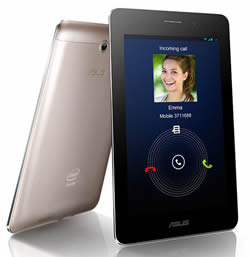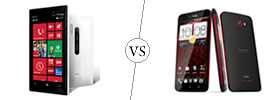Difference between Alcatel One Touch Idol Ultra and Asus FonePad
Key difference: The Alcatel One Touch Idol Ultra features a 4.65 inch HD AMOLED capacitive touchscreen with a resolution of 720 x 1280 pixels. The phone is powered by Dual-core 1.2 GHz processor on a MediaTek MTK 6577 and 1 GB of RAM. The phone has a width of 6.45mm, which has led the company to tout it as the thinnest smartphone on the market. Asus has announced the launch of newest phablet, the Asus Fonepad. The Fonepad is a 7-inch Android tablet that allows users to also make phone calls by placing the device on their ear. The phablet runs on 1.2 GHz single-core Intel Atom processor, making it pretty fast for multi-tasking, along with playing some high-res games. The device has 1 GB RAM.
 Alcatel-Lucent is a global telecommunications equipment company based in Paris, France. It is best known for providing telecommunications solutions to service providers, enterprises, and governments around the world. In addition, they also focus on fixed phones, mobile phones, converged networking hardware, IP technologies, software, and services.
Alcatel-Lucent is a global telecommunications equipment company based in Paris, France. It is best known for providing telecommunications solutions to service providers, enterprises, and governments around the world. In addition, they also focus on fixed phones, mobile phones, converged networking hardware, IP technologies, software, and services.
Among its many series of phones, one is the Alcatel One Touch, which is an Android based smartphone series. Some of the newest phones under the series are the Alcatel One Touch Idol, Alcatel One Touch Idol Ultra and Alcatel One Touch Idol X.
The Alcatel One Touch Idol Ultra features a 4.65 inch HD AMOLED capacitive touchscreen with a resolution of 720 x 1280 pixels. The phone is powered by Dual-core 1.2 GHz processor on a MediaTek MTK 6577 and 1 GB of RAM. The phone runs on Android OS, v4.1 (Jelly Bean). Alcatel One Touch Idol Ultra also features an 8 MP primary camera with digital zoom and LED flash, as well as 1.3 MP secondary front-facing camera for video calls. The phone comes with 16GB of internal storage, of which 13.3 GB is available to the user. The device also supports MicroSD to expand external usage up to 32 GB.
The phone has a width of 6.45mm, which has led the company to tout it as the thinnest smartphone on the market. However, to get this accolade of the ‘thinnest smartphone’, the device has had to compromise on some matters, such as the phone does not feature an audio jack. The phone does come with a USB to 3.5 mm jack adapter, which means that the USB port doubles as an audio port.
 Asus has announced the launch of newest phablet, the Asus Fonepad. The company states that the purpose of launching this phone is to bridge the gap between the phone and the tablet, eliminating the need for the carrying to separate devices. The Asus Fonepad is practically a tablet that has phone call making capabilities. The Fonepad is a 7-inch Android tablet that allows users to also make phone calls by placing the device on their ear. Some people may find it silly to place such a huge device on their ear to make calls; for those people the tablet does allow connectivity with a Bluetooth device.
Asus has announced the launch of newest phablet, the Asus Fonepad. The company states that the purpose of launching this phone is to bridge the gap between the phone and the tablet, eliminating the need for the carrying to separate devices. The Asus Fonepad is practically a tablet that has phone call making capabilities. The Fonepad is a 7-inch Android tablet that allows users to also make phone calls by placing the device on their ear. Some people may find it silly to place such a huge device on their ear to make calls; for those people the tablet does allow connectivity with a Bluetooth device.
The Asus Fonepad has borrowed a bunch of features from the Nexus 7, which was also created under Google and Asus collaboration. The weight, dimension and the display are all similar to the Nexus 7; however, the company has replaced the back. The plastic-leather back of the Nexus 7 has been replaced with a slick, steel casing. The device is available in titanium gray and champagne gold colors. The phablet sports a 7-inch IPS LED backlit touch screen that allowed multitouch capability for up to 10 people. The screen has a resolution of 1280 x 800, which provides approximately 216 ppi density, a decent enough resolution. Under the hood, the phablet runs on 1.2 GHz single-core Intel Atom processor, making it pretty fast for multi-tasking, along with playing some high-res games. The device has 1 GB RAM.
There will be two versions of the tablet, one for Europe, the other for Asia. The launch regarding rest of the World has yet to be revealed. The European variant will have 16 GB internal storage capacity, with no rear camera. However, the Asian variant will 8 GB internal storage capacity and will house a 3.2 MP rear camera. Both the variants will house 1.2 MP front camera for video conferencing. The phablet will not support 4G capabilities. The phablet will be available with preloaded Android v4.1 Jelly Bean, with no announcements yet regarding if it is upgradeable to the newest version. The internal storage capacity can expanded up to 32 GB using a MicroSD. One of the most prominent features of the phablet is the massive battery that has been mounted on the device. The non-removable Li-Ion 4270 mAh battery allows the phone to support 32.5 hours of talktime on 3G and 751 hours of standby time. There is no proper release date for the phone, with the expected release to be around April or May 2013.
The information for the detailed table about the two phones has been taken from the Alcatel One Touch Idol Ultra website, the Asus website, trustedreviews.com, pcworld.idg.com.au and GSMArena.com.
|
|
Alcatel One Touch Idol Ultra |
Asus Fonepad |
|
Launch Date |
Q2 2013 |
Expected April 2013 |
|
Company |
Alcatel |
Asus |
|
Size |
134.4 x 68.5 x 6.5 mm (5.29 x 2.70 x 0.26 in) |
196.4 x 120.1 x 10.4 mm |
|
Display |
HD AMOLED capacitive touchscreen, 16M colors |
7" LED Backlight WXGA IPS Panel touch screen |
|
Screen |
720 x 1280 pixels, 4.65 inches (~316 ppi pixel density) |
1280x800 (~216 ppi pixel density) |
|
Protection |
Corning Glass – Oleophobic coating |
N/A |
|
Weight |
115 g (4.06 oz) |
340 g |
|
2G Network |
GSM 850 / 900 / 1800 / 1900 |
GSM 850 / 900 / 1800 / 1900 |
|
3G Network |
HSDPA 900 / 2100 HSDPA 850 / 1900 / 2100 |
WCDMA: 850/900/1900/2100 HSDPA 850 / 900 / 1900 / 2100 |
|
4G Network |
No |
N/A |
|
GUI |
Custom UI |
Asus UI |
|
CPU speed |
Dual-core 1.2 GHz |
1.2 GHz Single-core Intel Atom |
|
GPU |
- |
PowerVR SGX540 |
|
OS |
Android OS, v4.1 (Jelly Bean) |
Android OS v4.1 (Jelly Bean) |
|
Chipset |
MTK 6577 |
Intel Atom Z2420 |
|
RAM |
1 GB RAM |
1 GB |
|
SIM Size |
Micro-SIM |
microSIM |
|
Internal Memory |
16 GB (13.3 GB user available) |
8/16 GB |
|
Expandable Memory |
Yes, microSD up to |
Up to 32 GB |
|
Sensors |
Proximity sensor, Light sensor, G-sensor, E-compass |
GPS & Glonass,G-Sensor, E-compass, Proximity, Ambient Light Sensor |
|
Connectivity |
Wi-Fi 802.11 b/g/n, Wi-Fi Direct Hotspot, USB Modem Tethering: Plug and Play, Bluetooth 4.0, Micro USB 2.0 high speed, GPS with A-GPS |
GSM, HSDPA, WCDMA, Bluetooth, USB, WLAN802.11 |
|
Data |
GPRS, EDGE, WLAN, Bluetooth, USB |
GPRS, EDGE, WLAN, Bluetooth, USB |
|
Speed |
HSPA: 7.2Mbps downlink, 5.76 Mbps uplink |
HSDPA 21 Mbps, HSUPA 5.76 Mbps |
|
WLAN |
Wi-Fi 802.11b/g/n, hot spot, Wi-fi direct |
WLAN802.11 b/g/n |
|
Bluetooth |
V4.0 |
Bluetooth V3.0 |
|
USB |
Micro USB 2.0 high speed |
microUSB v2.0 |
|
Primary Camera |
8 MP, LED Flash |
3.2 MP autofocus camera |
|
Secondary Camera |
1.3 MP, HD 720p |
1.2 MP |
|
Video |
720p@30fps |
720p |
|
Camera Features |
Digital Zoom, LED Flash, Face and smile detection, Photographic filters, Panoramic and Matrix Style Pictures |
Autofocus |
|
Sound Enhancement |
HD Sound enhancer |
Active noise cancellation with dedicated mic; Asus Sonice Master audio technology with MaxxAudio 3 by Waves |
|
Audio supported formats |
AAC, AAC+, AAC Enhanced, WB AMR, MP3, Midi |
MP3/WAV/eAAC+ player |
|
Video supported formats |
H.263, MPWG4, H.264 |
MP4/H.264/H.263 player |
|
Battery Capacity |
Lithium-ion 1820 mAh |
Non-removable Li-Ion 4270 mAh battery (16 Wh) |
|
Stand-by |
2G: 700h 3G: 400h |
3G: 751 hours |
|
Talk time |
2G: 16h 3G: 8.5h |
3G: 32.5 hours |
|
Available Colors |
Black, Flash Red, Flash Yellow, Green, Blue, Pink |
Titanium Gray, Champagne Gold |
|
Messaging |
SMS(threaded view), MMS, Email, Push Email, IM |
SMS(threaded view), MMS, Email, Push Email, IM |
|
Browser |
HTML |
HTML5 |
|
Radio |
Stereo FM radio with RDS |
No |
|
GPS |
Yes, with A-GPS support |
GPS, A-GPS, Glonass |
|
Java |
Yes, via Java MIDP emulator |
Yes, via Java MIDP emulator |
|
Additional Features |
|
|
Image Courtesy: alcatelonetouch.com, asus.com









Add new comment